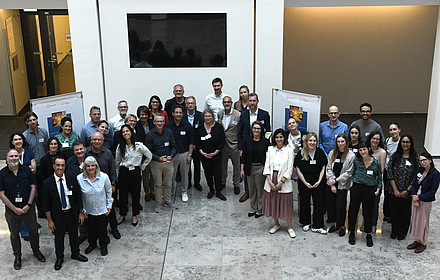Charité Strengthens Ties with CLALIT Health Services for Improved Healthcare
During the COVID-19 pandemic, Israel impressively demonstrated how efficient patient data collection can be used to advance research into the prevention of infections and development of therapies. One of Israel’s largest healthcare organizations, Clalit Health Services, has since been cooperating with Charité – Universitätsmedizin Berlin with the aim of combining Israeli expertise in the use of “big data” with innovative biomedical research approaches by Charité scientists. As part of the cooperation, one of the first joint projects has now received EU funding.
Charité – Universitätsmedizin Berlin and Clalit Health Services began working together in a strategic scientific partnership two years ago. “At first glance, both Charité, one of the largest university hospitals in Europe, and Clalit, a health management organization, may appear very different. However, this is precisely what makes this partnership so appealing and holds so much potential,” explains Prof. Dr. Heyo Kroemer, CEO of Charité. “Clalit’s particular strength lies in its outstanding digital infrastructure and its ability to put innovations such as AI-driven care platforms into practice on a large scale.” Clalit Health Services, the largest public healthcare organization in Israel, operates a network of 14 hospitals, over 1,300 primary care clinics, pharmacies, and dental clinics, and serves approximately 5 million members. Through its innovation hub, Clalit Innovation, it promotes advanced research and development.
In June 2022, two Charité scientists – Prof. Friedemann Paul, director of the Experimental and Clinical Research Center and Prof. Leif Erik Sander, director of the Department for Infectious Diseases and Critical Care Medicine – officially initiated the collaboration at a first scientific workshop. At this meeting, ten German-Israeli interdisciplinary research group tandems were established in the fields of AI and health data, immunology and infectious diseases, imaging, oncology, and cardiology. In June of this year, a second follow-up meeting took place at the Charité, where scientists from Tel Aviv and Berlin presented results and plans for ongoing joint projects in more than 40 lectures, and formed new project groups in the fields of women’s health and mental health in workshops. Prof. Dr. Joachim Spranger, Dean of Charité, expressed his enthusiasm at the opening of the event: “The collaboration with Clalit offers unique opportunities to improve data analysis and AI solutions. The processing and use of such high-quality health data makes it possible to better predict disease progression and treatment outcomes, identify previously unknown disease patterns, and ultimately offer patients suitable diagnostic and therapeutic measures at an early stage.”
EU funds German-Israeli research project
One example of this future-oriented collaboration is the joint Charité and Clalit project EXPLORE – NB, led by PD Dr. Hedwig Deubzer, senior physician at the Charité Department of Pediatrics. It has recently been accepted in the HORIZON 2020 program ERA-NET and received funding of about 939.000 Euro.
Together with her Israeli colleagues Dr. Esther Berko, Dr. Assaf Grunwald, Dr. Nurit Gal Mark, and other European partners, they will be working intensively over the next three years on the question of whether molecular markers of solid tumors in children, such as neuroblastoma, can also be identified in the so-called biofluids and thus less invasively. Biofluids include blood, bone marrow, urine, and cerebrospinal fluid. The liquid biopsies can be obtained minimally to non-invasively, with low risk, and can therefore be performed serially. Dr. Deubzer emphasizes: ” Our hypothesis is that we can monitor therapy response with liquid biopsies and detect and understand the emergence of therapy resistance at an early stage. In EXPLORE-NB, we will focus on epigenetic changes. Our cooperation is based on the research goal of increasing the chances of recovery and improving health monitoring after childhood cancer. Together, we would therefore like to examine the significance of the EXPLORE-NB research data in a clinical study in the future.”
Close cooperation despite challenges
Just how close the cooperation is after only two years and despite the pandemic and Middle East conflict is also demonstrated by the visiting professorship for Prof. Ran Balicer, funded by Stiftung Charité. The Israeli physician and public health expert Prof. Balicer will set up a working group at Charité over the next three years as part of Stiftung Charité’s Visiting Fellowship Program and continue to promote cooperation between the two institutions. “We find this ongoing collaboration between Charité and Clalit to be of the highest scientific merit and potential clinical impact. The ability of top-notch clinicians and researchers on both sides to use the unparalleled data resources of Clalit has a strong synergistic effect that allows for groundbreaking research on multiple scientific domains,” says Prof. Ran Balicer, Chief Innovation Officer of Clalit. He adds: “We are pleased to see the launch of a new cohort of collaborative efforts this week, and are sure these will further increase the beneficial impact this research has on patients’ lives and wellbeing – in Germany, in Israel, and worldwide.”

